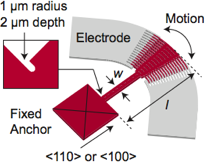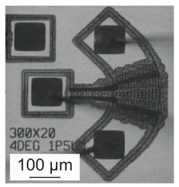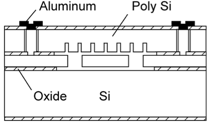Fatigue Study of Silicon Using Encapsulated MEMS Resonators
Many silicon based MEMS devices, such as vibratory rate gyroscopes and micro actuators, are exposed to cyclic loadings with a large stress amplitude. As a result, fatigue in single crystal silicon is an important aspect that should be considered to ensure reliability and to improve the performance of those devices by setting a proper safety factor. Howeve, despite the past efforts, the exact mechanicsm of silicon fatigue has not been resolved due to limitations in test environmental control. To date, the role of oxygen and humidity remains controversial.
'Epi-seal' encapsulation developed in our group gives us an oxygen and humidity free test environment that no prior work has been able to accomplish. Previous experiments on 'epi-seal' resonators have demonstrated no measurable frequency change during 10,000 hours at lower stress levels (<150 MPa), thereby ruling out many possible causes of frequency changes that may be observed.
We fabricated wedge-shaped micromechanical resonators in the 'epi-seal' encapsulation to study the fatigue of silicon (Fig. 1-3). A notch on the cantilever beam produces stress concentration, while the amplitude of oscillation is measured by the capacitance change in the comb fingers. The fabricated device is connected to an oscillator crcuit to apply a controlled amount of cyclic loading. A counter records the resonant frequency of the device in real time, which immediately reflects any mass or stiffness change in the test specimens. If any crack initiates through fatigue, the stiffness of the test section is reduced, resulting in resonant frequency decrease.
We are currently working on the measurement of fabricated resonators with various stress and temperature conditions.
This work is suported by DARPA CIEMS project. For further information, please check related publications or contact us.
Related Publications:
- S. Yoneoka, Y. Q. Qu, S. Wang, M. W. Messana, A. B. Graham, J. Salvia, B. Kim, R. Melamud, G. Bahl, and T. W. Kenny, "High-cyclic fatigue experiments of single crystal silicon in an oxgen-free environment," Proc. 23rd IEEE MEMS 2010, Hong Kong, 2010, pp. 224-227.
- A. B. Graham, M. W. Messana, P. G. Hartwell, J Provine, S. Yoneoka, R. Melamud, B. Kim, R. T. Howe, and T. W. Kenny, "A method for wafer-scale encapsulation of large lateral deflection MEMS devices," Journal of Microelectromechanical Systems, Vol. 19, No. 1, pp. 28-37, 2010. DOI: 10.1109/JMEMS.2009.2035717
Contact Information:
Address: Bldg. 530, Room 224, 440 Escondido Mall, Stanford, CA 94305
Email: yoneoka AT stanford DOT edu
 |
Figure 1: Schematic of fatigue test structure. |
 |
Figure 2: IR image of the encapsulated device. |
 |
Figure 3: Cross-section of the 'epi-seal' encapsulated device. |